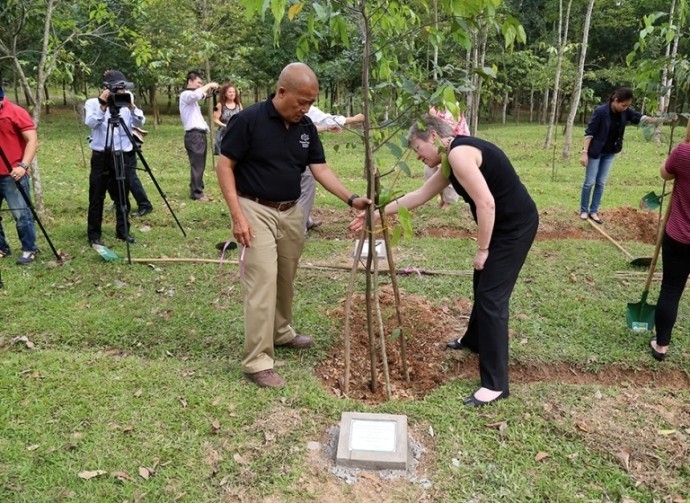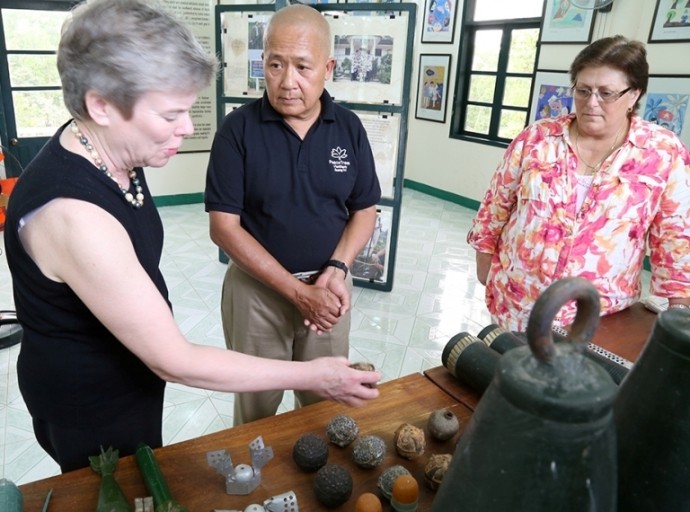(VOVworld) – Peace trees Vietnam is the first US non-governmental organization allowed to operate in Vietnam with the aim of clearing unexploded ordnances left over from the war and providing social support mainly in the central province of Quang Tri. To mark the organization’s 20 years in Vietnam, Anh Huyen interviewed its Executive Director Bob Stokes about its past activities and future plans:
Question: “Peace trees” was the idea of a mother whose son died in the war in Vietnam. Can you tell us about Peace Trees Vietnam?
Answer: In the very first days that the people who founded Peace Trees learned that the Vietnamese government and the American government were formalizing relations, one of them got on an airplane and flew all night to Washington DC from where we live in Seattle, knocked on the door of the Vietnamese delegation and said “You don’t know me but I have an idea. And the idea was that citizens in America could do something to heal the wounds from the war without trying to have a political agenda, just trying to help the pain that was there in Vietnam from the war. It’s also to bring American citizens closer to Vietnamese citizens so that they can learn from each other and understand their history together. We think that when we understand the history of another country, we won’t have any trouble with that country. So that’s how we began. Ever since we asked the people in Hanoi who we met “where can we go?”, “what is the part in Vietnam that is the most troubled, the most hurt from the war? And they said “you need to go to Quang Tri.” Quang Tri is a very small province but 40% of the explosives used during the war were used in Quang Tri, a little tiny place. That is why we came to Vietnam.
 |
Question: During a visit to Vietnam in February, 2015, US Undersecretary of State Rose Gottemoeller said the US would provide 10 million USD this year for detecting and clearing unexploded ordnances in Vietnam, particularly in Quang Tri. This project is evidence of the American government’s cooperation and involvement in dealing with the consequences of bombs and mines in Quang Tri and Vietnam. As the organization in charge of carrying out this task, what will Peace Trees Vietnam do in the coming years?
Answer: We are very pleased that Peace Trees is with the money that the US government is putting into the effort in Quang Tri. I should emphasize that Peace Trees is not the only NGO working in Quang Tri. What all the mine action organizations and Peace Trees will be doing in Quang Tri is making sure that all the weapons that they found noted in their database so that we will be able to say when land has been cleared and can be put back to use. It’s our hope that will be a small number of years, maybe 7 years, we will be able to put the risk down to a point where we’ll not destroy people’s daily lives and their economic health. The risk will never be gone but the risk should be down to a place where people will know that they will be safe in their daily lives.
 |
Question: Peace Trees has gained knowledgeable results in tackling the war’s aftermath with a large amount of bombs, mines, and explosive devices detected and destroyed. This could be attributed to the organization’s advocacy for personnel, equipment, and finance among American citizens. What does Peace Trees think of the feelings of American citizens toward Vietnam?
Answer: We are an American organization, a group of citizens that is not part of the government. What we try to do is to make the problem that is still here in Vietnam, the damage from the war, known to people in America. We have a website and we have movies made. We try also every year to bring a number of trips over here to Vietnam not of government people but just citizens who can go out to the countryside in Quang Tri, work with the poor people or plant some trees. The environment in Quang Tri was very destroyed by the defoliant Agent Orange so one of the things that we do is plant trees so that’s why we have the name Peace Trees. We find that when we bring the citizens over here to Vietnam, eyes open, people understand more and they take stories home and they tell their friends. We are very heartened by the fact that what I see in Americans now is really nothing but warm feelings about Vietnam. There’re things that have changed dramatically in the last 20 years and it’s really good thing to have watched.
Question: Vietnam-US relations have developed steadily over the last 40 years. The US dealing with the war’s aftermath in Vietnam through meetings with Vietnamese agencies, citizens, and war veterans, has contributed considerably to bilateral ties. As an NGO with close links with Vietnam, what is Peace Tree’s plan to further boost Vietnam-US relations?
Answer: We are going to continue what we call our citizen diplomacy program. This week we have a large group coming over to help celebrate our 20th year. Those plans will keep coming. We also bring university classes over and they do significant work in Quang Tri. They have built playgrounds, they have built soccer fields, they have helped repair buildings. They always do something concrete, something real to try to help them understand the people in the province. We do talk regularly to the American government to help get financial support for our work and we find that the American government and the embassy as well here in Hanoi have been very supportive. My hope is that this is not just a historical thing, it’s not something from the past, everybody wants to keep it going for the future because some how we’ve become, I think, very good friends.
Thank you!
Since 1995 Peace Trees has helped to remove and destroy approximately 65,000 explosive devices and clear 140 million hectares of contaminated soil. It has also been involved in humanitarian activities including building kindergartens, schools, libraries, and homes, contributing to peace and friendship between the two countries.